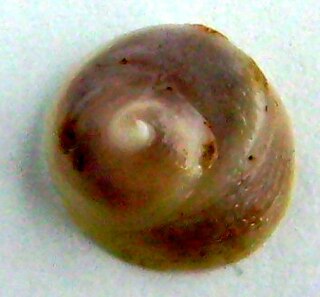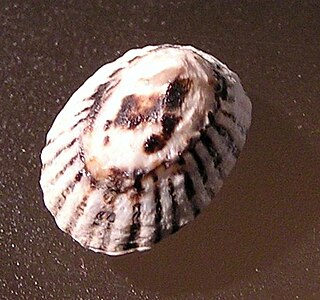
The Patellogastropoda, common name true limpets and historically called the Docoglossa, are members of a major phylogenetic group of marine gastropods, treated by experts either as a clade or as a taxonomic order.

Fissurellidae, common name the keyhole limpets and slit limpets, is a taxonomic family of limpet-like sea snails, marine gastropod molluscs in the clade Vetigastropoda. Their common name derives from the small hole in the apex of their cone-like shells. Although superficially resembling "true" limpets, they are in fact not closely related to them.

Patellidae is a taxonomic family of sea snails or true limpets, marine gastropod molluscs in the clade Patellogastropoda.

The Calyptraeidae, the slipper snails or slipper limpets, cup-and-saucer snails, and Chinese hat snails, are a family of small to medium-sized marine prosobranch gastropods. This family includes the slipper snails, the Chinese hat snails,, and the cup-and-saucer snails among others.

Nacella is a southern, cold-water genus of true limpets, marine gastropod molluscs in the family Patellidae, the true limpets.
Radiacmea inconspicua is a species of small sea snail or true limpet, a marine gastropod mollusc in the family Lottiidae, one of the true limpet families.

Notoacmea is a southern genus of true limpets, marine gastropod molluscs in the family Lottiidae, the true limpets.

Patelloida is a genus of sea snails or true limpets, marine gastropod molluscs in the family Lottiidae, one of the families of true limpets.
Atalacmea is a genus of sea snails or true limpets, marine gastropod molluscs in the family Lottiidae, one of the families of true limpets.
Notoacmea daedala is a species of sea snail or true limpet, a marine gastropod mollusc in the family Lottiidae, one of the families of true limpets.
Notoacmea subtilis is a minute species of sea snail or true limpet, a marine gastropod mollusc in the family Lottiidae, one of the families of true limpets.

Notoacmea scopulina is a species of sea snail or true limpet, a marine gastropod mollusc in the family Lottiidae, one of the families of true limpets.
Notocrater is a genus of deep-water true limpets, marine gastropod molluscs in the family Pseudococculinidae, one of the families of true limpets.

Cellana denticulata, or the denticulate limpet, is a species of true limpet, a marine gastropod mollusc in the family Nacellidae, one of the families of true limpets. It is endemic to New Zealand.

Cellana radians, common name the radiate limpet, is a species of true limpet, a marine gastropod mollusc in the family Nacellidae, which is one of the true limpet families.
Cellana strigilis chathamensis is a subspecies of large limpet, a marine gastropod mollusc in the family Patellidae, one of the families of true limpets.

Cellana strigilis strigilis is a species of large limpet, a marine gastropod mollusc in the family Nacellidae, one of the families of true limpets.
Maoricrater is a genus of true limpets, marine gastropod molluscs in the family Lepetidae, the true limpets. This genus is endemic to New Zealand. It can grow up to 4 mm in length.
Maoricrater explorata is a southern, cold-water species of limpet, a marine gastropod mollusc in the family Lepetidae, the true limpets. It is found in New Zealand.
Notoacmea elongata is a species of sea snail, a true limpet, a marine gastropod mollusk in the family Lottiidae, one of the families of true limpets.
Arthur William Baden Powell was a New Zealand malacologist, naturalist and palaeontologist, a major influence in the study and classification of New Zealand molluscs through much of the 20th century. He was known to his friends and family by his third name, "Baden".
HarperCollins Publishers L.L.C. is one of the world's largest publishing companies and is one of the Big Five English-language publishing companies, alongside Hachette, Macmillan, Penguin Random House, and Simon & Schuster. The company is headquartered in New York City and is a subsidiary of News Corp. The name is a combination of several publishing firm names: Harper & Row, an American publishing company acquired in 1987, together with UK publishing company William Collins, Sons, acquired in 1990.

The International Standard Book Number (ISBN) is a numeric commercial book identifier which is intended to be unique. Publishers purchase ISBNs from an affiliate of the International ISBN Agency.











